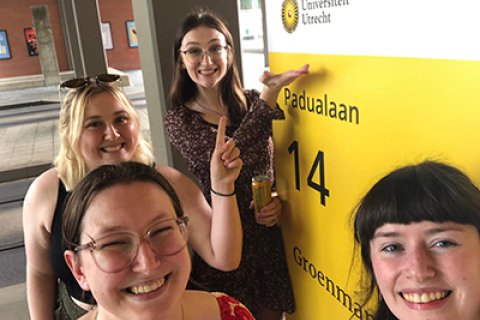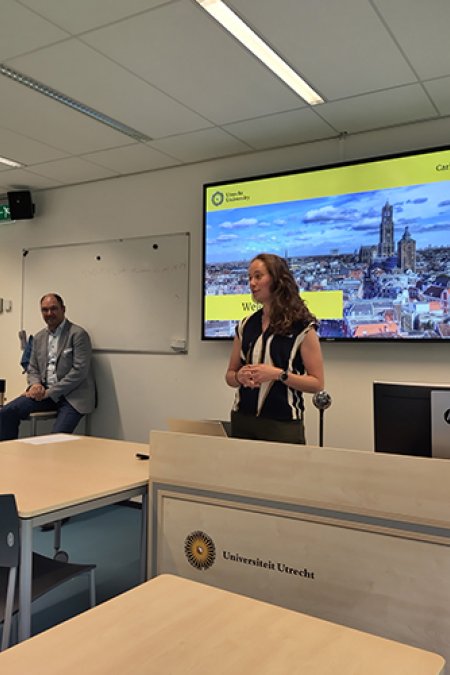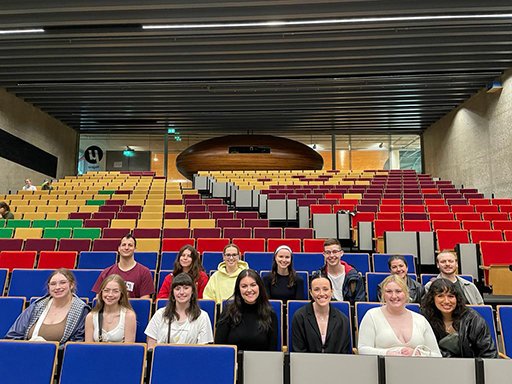There is more to sex than what happens between the sheets
Together with several colleagues, Assistant Professor Jenneke van Ditzhuijzen provides the Youth and Sexuality course for students on the Bachelor of Interdisciplinary Social Sciences programme. She calls for more research and education on sexuality and is developing a new minor.

“The Netherlands is known for the country’s comprehensive approach to sex education, openness about sexuality, and low rates of sexually transmitted infections & unintended pregnancies. They are often seen as a model for other countries in sexuality and sex and relationship education.” That is according to the website of Canada's Mount Allison University last autumn, in an article aimed at recruiting students who wanted to spend two weeks in Utrecht. The topic: intercultural sex education and sexual health.
Differences in sexual education

They have since arrived: 15 Canadian students and two staff members are spending time with Utrecht students taking the Youth & Sexuality course. They participate in the working groups together and that is when cultural differences become clear, Jenneke says. "During one lecture, a Canadian student asked me what I thought was a good time to talk to children about sex. So I replied: well, around the age of 2 or 3, when they're in the bath and start asking questions. That really shocked the Canadian students. There, you sit down with your parents for 'the talk’ when you’re about 12. Mount Allison University is in a rural, remote area where they are quite religious. A new world opens up for the students here in Utrecht." The Utrecht and Canadian students consequently talk a lot about the differences in sexual education. Jenneke: "The context of culture and social norms are very important to how you feel. Sexuality often concerns gender norms and inequality in that respect, power, relationships, as well as being in tune and making contact." This is the second time the exchange has taken place. Canadian associate professor Lisa Dawn Hamilton gave a lecture on the biological and hormonal aspects of sexuality, and spoke at a private symposium with Dutch researchers about research into sex and hormones.
Not everyone needs to know everything about sex, but professionals should at least be able to raise the topic.
Mainstreaming sex
But are the Dutch really as open as the Canadian university claimed in its recruitment blurb? Are we a model country? Jenneke van Ditzhuijzen: "We have major social problems in that area. Take sexual harassment and other inappropriate behaviour, the scale of which is inconceivable. While many scientists think sex is a very specialised subject, I and others working on this topic feel that every psychologist, educator, and policy maker should know at least something about it. Maintaining that this subject can only be approached dealt with by sexologists with specialist training is never going to solve the problems. People’s response to this topic is often 'I don't know, it feels daunting, uncomfortable’. That is why we are trying to make sex more mainstream. Not everyone needs to know everything, but professionals should at least be able to raise the topic. I believe it should be possible, also at this faculty, to learn more about what homosexual, transgender or intersex persons go through, for example. Contrary to what is often thought, there is more to sex than what happens between the sheets, it also concerns such social issues as sexual violence, acceptance of LGBT people, and inclusion."
SEKSO
So more and broader knowledge is needed, Jenneke van Ditzhuijzen feels. The research network SEKSO (link in Dutch), set up by Utrecht University and Rutgers, should give this impetus. "SEKSO is a network of 150 researchers from such universities and knowledge institutions as Movisie and Rutgers, who conduct research on sex in the broadest sense of the word. There is a lot going on."

New minor
The subject could receive more attention in education as well. Thanks to an FSO grant, Jenneke is able to set up a minor together with colleagues from her own and other departments. "Two courses have already been developed. Our ISS course Youth and Sexuality covers the basics, focusing on young people. Cultural Anthropology also already has a course on sexuality and the body. We are also developing a course on policy and the political aspects and one on the psychological aspects of sexuality.' The latter course will revive expertise that was largely lost when Liesbeth Woertman retired.
The Canadian students and staff will be in Utrecht until 21 May.

